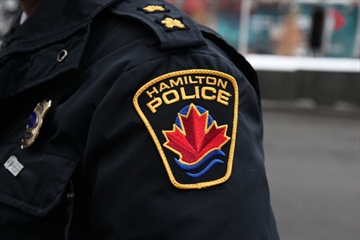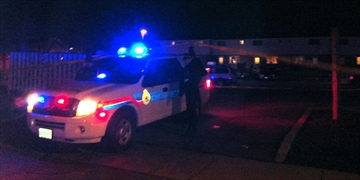A Great Read...
I was sent this article and was completely moved by the honest account of one Police Officer's experience. An experience that Police Officer's face everyday for the duration of their career.
This article really compelled me because they were just talking on the radio about some members of the Toronto Police Service still carrying on the practice of carding and one man's comment on the radio was that "Police Officer's think they are above the law and can do anything they want and get away with it." I remember shaking my head thinking, not ALL of them are the same way. Much like the rest of us do not like being painted with the same brush I believe it is unfair to refer to every Police Officer as "The Police". It's not right. Having said that, yes, there are many Police Officers out there that make it bad for the rest who are trying to do their jobs in a respectful manner with efforts to make the community understand that they are not always against them.
Take a look at the article below found in The Hamilton Spectator. It can also be found on their site using this link:
Opinion: For Ian’s sake — change
Police officers face stresses inherent to the job and need more helping dealing with them than they’re getting
Hamilton Spectator
By‘A Concerned Cop’
The following is a submission from a Hamilton police officer who has struggled with mental health issues. He has requested anonymity to address concerns about the impact of speaking out on his career. Typically, The Spectator does not publish anonymous work, but is making an exception in this case because there is compelling public interest in this story being told. We extend our thanks to the author.
The casket is buried. The flag is folded. The forage cap now proudly sits in a son's bedroom. The sounds of Amazing Grace and the Lord is My Shepherd have long been silenced. The hall is cold, dark and empty. For nearly all of the thousand-plus people who attended the visitation and memorial service for Hamilton police Staff Sergeant Ian Matthews, life has returned to normal.
Nearly all.
Like the many scars that tormented Ian, there are new scars, there forever, on many people. His family. His friends. His colleagues. Those who were with him in the change room that fateful moment. Those who investigated his death. One must wonder what will be done for them. What will change? Or, will the cycle go on? Will trauma, emotions, turmoil, cumulative stress disorder, PTSD, depression, substance abuse, and family problems among police officers continue to be ignored? Ian was certainly not the first. Will any attempts be made to ensure he is the last?
It is a well-known fact that police officers are more likely to die by their own hand than by that of an assailant. While suicide rates among police are not statistically much higher then the general population, one must wonder why individuals who are psychologically screened at the beginning of their careers and found to be stable, ultimately end up committing suicide with the same frequency as the general population.
There has been a litany of investigations and studies into police mental health, including a report published by Ontario Ombudsman Andre Marin in October 2012 titled In the Line of Duty. The conclusion is nearly always the same: Things must change. And yet, nothing does.
I know first-hand the struggles faced by our police officers every day. I am one. In my tenure as a Hamilton police officer, I have seen, smelled, heard and experienced my fair share of trauma. I have performed CPR unsuccessfully numerous times. I have seen people die before my eyes, helpless to do anything. I have responded to violent robberies, assaults and homicides. I have investigated suicides by hanging, shotgun blasts and drug overdoses. I have sat in many homes telling family that their loved one has passed. I have experienced screaming, punching, throwing things, swearing and silence as I break the news. I have been desperate to find some word, some comfort, some way to dull their pain.
I have experienced gore beyond anything that can be captured by stories, video games, or movies. I've smelled death in a way that will haunt me forever and that I can never forget. I have suffered anxiety over the simplest "normal things" that remind me of horrendous situations that I have been in. While some incidents are burned in my emotions and memory forever, I am incapable of counting or even remembering every incident because there are so many. Some will never pass.
Even a regular "noneventful" day is one of constant stress and a state of high alert. 911 calls are emergencies. Family troubles, domestics, robberies and assaults are all highly emotional and volatile situations. Our job is to respond when people are in the midst of an extremely difficult crisis. While we are called to help, someone involved in the situation is undoubtedly unhappy at our presence. Often the volatility of the situation is turned against us.
I have been kicked, punched, screamed at and spit on. I have been sworn at in every way imaginable. My integrity and professionalism as been questioned, mocked and scorned. I've been called biased, bigoted and racist for no other reason then the colour of my skin and the occupation I hold. I have been hated for the uniform I wear. To many, I ruin lives.
If an arrest is ultimately required, I attempt to do it in a manner that uses the least amount of force necessary and maintains the dignity of the accused. Despite my best intentions, I am often unwillingly drawn into a confrontation, leaving me in the inevitable situation of having to use force. Sometimes that force is severe. I have feared for my life. I cannot get angry or frustrated, but must at all times be reasonable. Even in face of grave danger, I must maintain control. No one else is coming.
Even a simple traffic ticket ruins someone's day.
Everything I do is scrutinized. By the public, my bosses, the courts, the SIU and the media. I am required to articulate and justify every observation, every word, and every action. I am even required to explain any inaction I may determine appropriate. I am held accountable under numerous pieces of legislation including the Police Services Act. If I misstep, I am charged twice for every offence. I am included in the large category of "The Police" and bear responsibility for every one of my coworkers' sins. Stories of corrupt cops sell newspapers.
I work Christmas, New Year's and Thanksgiving. I miss birthdays, funerals and weddings. My spouse tries to explain to the kids why, once again, I am not there to open presents. I am subpoenaed to court on my days off. I am not asked and do not have a choice. Regardless of my plans for my downtime, I must go.
My phone number is not listed. Neither my hydro bill nor my house is registered in my name. I drive home from work making sure I am not followed. Off duty, I hide my badge and keep my occupation to myself. On duty I choose restaurants carefully knowing that in some, someone may spit in my food.
I am a parent, a spouse, a lover and a friend. I try my best to live a normal life outside of work. But to think that one can simply forget the experiences of my job is not only naïve, but dangerous. The trauma at work affects me in ways I don't even realize. I sleep poorly. Get angry easily. Take out pent up frustration on those who deserve it least. I lash out at those who most want to support me. I have a tendency to drink too much. The alcohol dulls the hypervigilance and quiets the mind. At times only it can provide the solace so desperately coveted.
And so, my own family suffers. My spouse lives a roller-coaster existence never knowing when I will leave for a call-in to deal with a crisis. Not knowing when I will be home. Often when I am home, I am disengaged while trying desperately to recover from the time spent at work. For many police families, the stresses are too severe, causing permanent damage and often divorce.
Every officer reading this knows it's true. But what do we do? Nothing. We are trained to have answers, to hide weakness, and to control situations. We are the ones who respond when help is needed. So we cover it up. We hide our emotions, gloss over the problems and hope we can ride it out. Any attempt to seek out help voluntarily results in a stigma and is essentially a career killer for us. If we end up having an emotional breakdown and are ordered off duty, we are marginalized and abandoned. We have witnessed this happen to friends and colleagues before us.
Even though we are told there is an open forum, any questioning of the norm is met with punitive consequences. So we hide. We fake. And as was said at Ian Matthews' funeral, the drops of freezing rain accumulate. Drop after drop. The ice gets thicker until, under the weight, the tree breaks.
Yes, programs exist. Hamilton Police Service has an Employee Assistance Program. I know first hand that while this may be beneficial for a short-term solution, it does not provide any long-term services. Operational stress is not solved by an hour-long phone conversation but requires constant counselling, re-evaluation, and monitoring. Mandatory psychological assessments with a psychiatrist should exist after every critical incident and at regular intervals throughout the officer's career. A mandatory, proactive approach is needed. Seeking psychological help should be the norm, not a weakness. Lives depend on it.
Yet, I love my job. Despite the immense personal costs, there are small blessings that make it worthwhile. Although I will never change the world, I do hope that through my professionalism, integrity and diligence, I may yet have a positive influence on at least some lives.
On a shift before Christmas, one fine gentleman insisted on purchasing my morning coffee. He shook my hand and thanked me for the job that I do. This small gesture, although completely unnecessary, melted some of my ice.
Thank you.
Ian, I pray you are the last.




Comments
Post a Comment